- 易迪拓培训,专注于微波、射频、天线设计工程师的培养
MicrochipdsPIC33F离线1000WUPS电源参考设计
录入:edatop.com 点击:
不间断电源( UPS)参考设计采用dsPIC33FJ16GS系16位数字信号控制器(DSC),输入交流电压210 – 242V, 50 Hz (+/- 3 Hz),输出交流电压220V @ 50 Hz (+/ - 1 Hz),额定功率1000VA,效率84%,纯正弦波输出THD小于3%,火线到电池转换时间小于10ms,可用作计算机和通信设备的保护电源.本文介绍了UPS参考设计主要指标,采用dsPIC33FJ16GS504的离线UPS方框图,电路图,材料清单和PCB元件布局图.
Digital Pure Sine Wave Uninterruptible Power Supply (UPS) Reference Design dsPIC33FJ06GS101/X02 and dsPIC33FJ16GSX02/X04 Data Sheet High-Performance, 16-bit Digital Signal Controllers
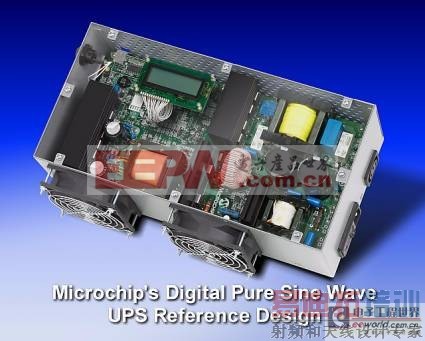
图1.正弦波UPS参考设计外形图
UPS参考设计输入/输出指标:
Input / Output Specifications:
Input Range AC:
95 – 135V, 60 Hz (+/ - 3 Hz) (110V version)
210 – 242V, 50 Hz (+/- 3 Hz) (220V version)
Output Voltage AC:
110V @ 60 Hz (+/ - 1 Hz) (110V version)
220V @ 50 Hz (+/ - 1 Hz) ( 220V version)
DC Input:
36V (12 VDC X 3)
Lead Acid Battery
Rating:
1000 VA Steady-State Output Power
1350 VA Peak Power (Surge)
Features:
High-frequency design
Adjustable Charging current
Efficiency of 84%
Pure sine wave output with THD 3%
Mains to Battery Transfer time 10 ms
Supports Crest Factor of 3:1
Minimum Power Factor(Leading/Lagging) of 0.65
Fault indications
USB Communication with PC
LCD front panel
An Uninterruptible Power Supply, or UPS, is an electronic device that provides an alternative electric power supply to connected electronic equipment when the primary power source is not available.
Unlike auxiliary power, a UPS can provide instant power to connected equipment, which can protect sensitive electronic devices by allowing them to shut down properly and preventing extensive physical damage. However, a UPS can only supply energy for a limited amount of time, typically 15 to 20 minutes.
Although its use can extend to a virtually unlimited list of applications, in past years the UPS has become even more popular as a means of protecting computers and telecommunication equipment, thus preventing serious hardware damage and data loss.
Types of UPS Systems
A typical UPS for computers has four basic protection roles: being able to cope with power surges, voltage shortage, complete power failure and wide variations in the electric current frequency. There are three types of UPS systems, depending on how the electric power is being stored and relayed to the electronic device connected to them:
Offline UPS (also known as Stand-by UPS)
Line-Interactive (or Continuous UPS)
Online UPS (often called double conversion supply)
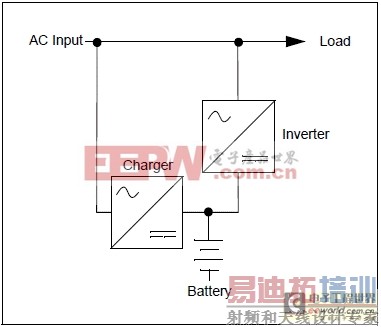
图2.离线UPS方框图
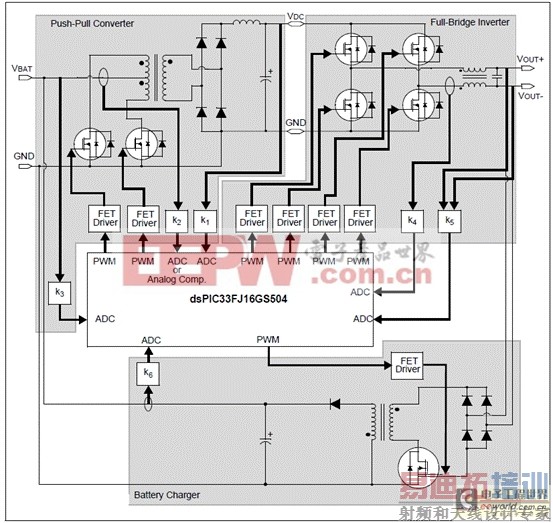
图3.采用dsPIC33FJ16GS504的离线UPS方框图
The reference design in this application note describes the design of an Offline Uninterruptible Power Supply (UPS) using a Switch Mode Power Supply (SMPS) dsPIC Digital Signal Controller (DSC).
The Offline UPS Reference Design consists of three major UPS topology blocks:
Push-Pull Converter (steps up the DC battery voltage to a constant high-voltage DC)
Full-Bridge Inverter (converts DC voltage to a sinusoidal AC output)
Flyback Switch Mode Charger (current source and charges battery with constant current)
1kW离线UPS主要指标:
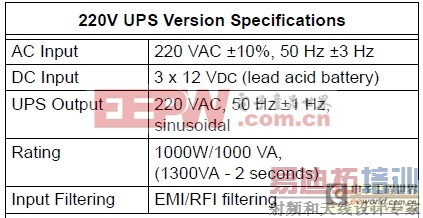
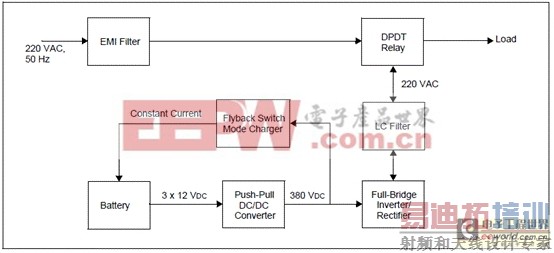
图4.离线UPS参考设计框图
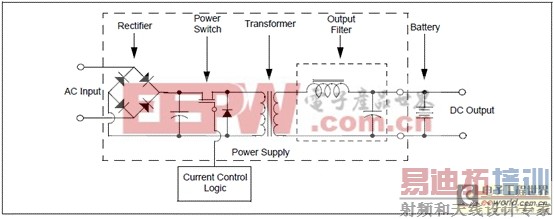
图5.开关模式充电器框图
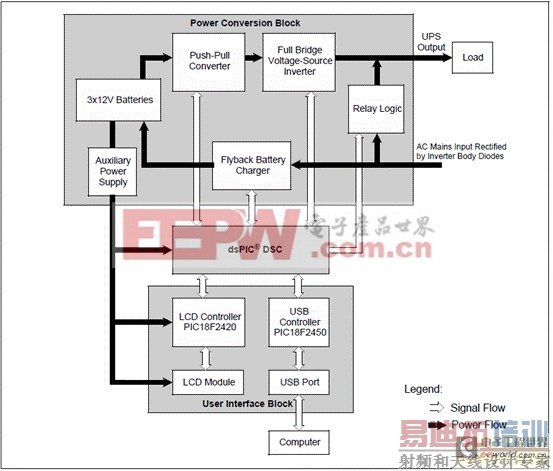
图6.离线UPS详细框图
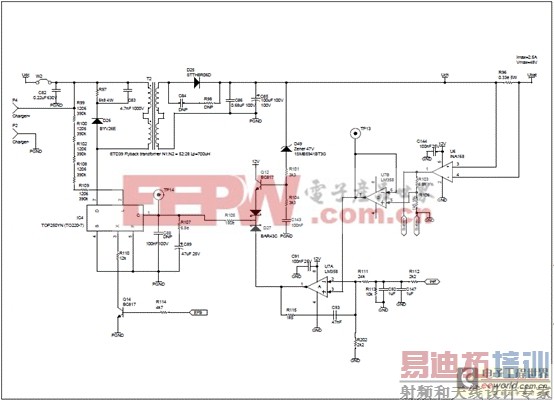
图7.离线UPS参考设计电路图(1)
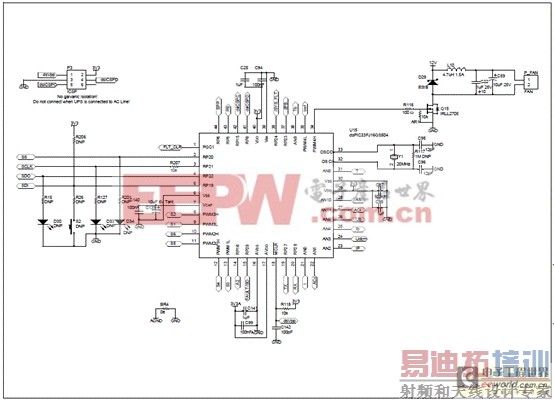
图8.离线UPS参考设计电路图(2)
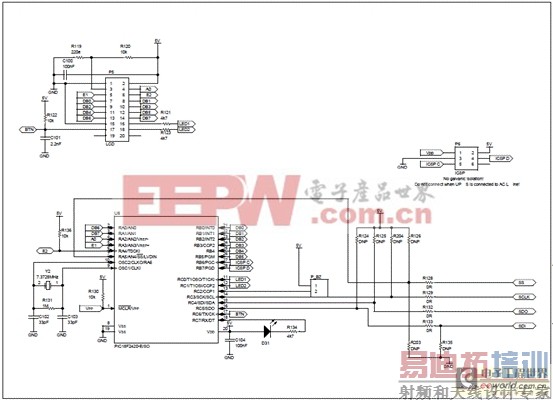
图9.离线UPS参考设计电路图(2)
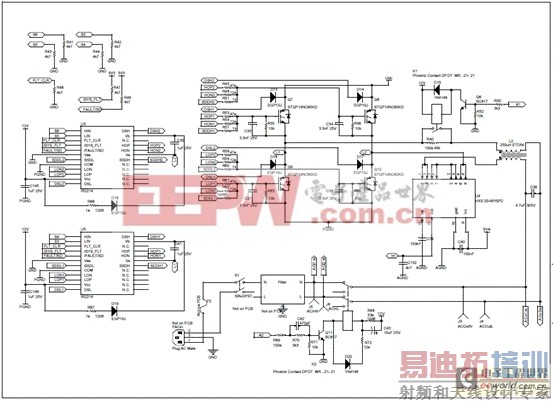
图10.离线UPS参考设计电路图(3)
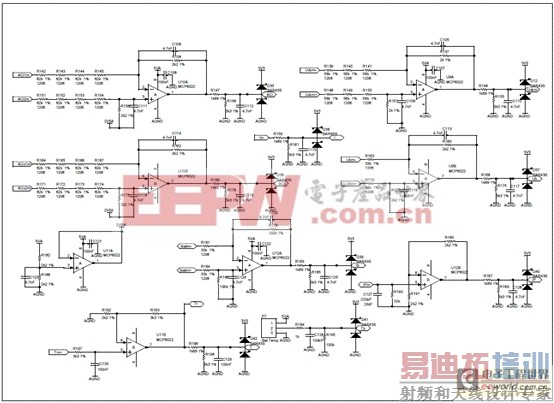
图11.离线UPS参考设计电路图(4)
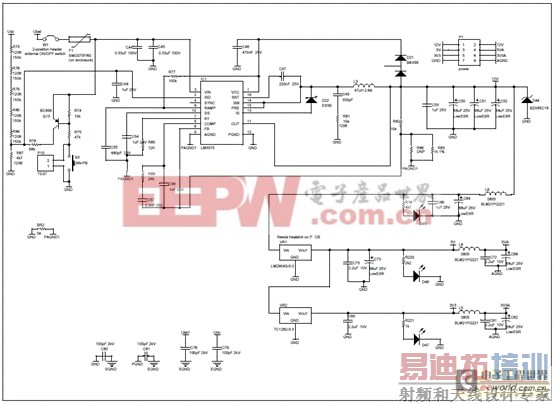
图12.离线UPS参考设计电路图(5)
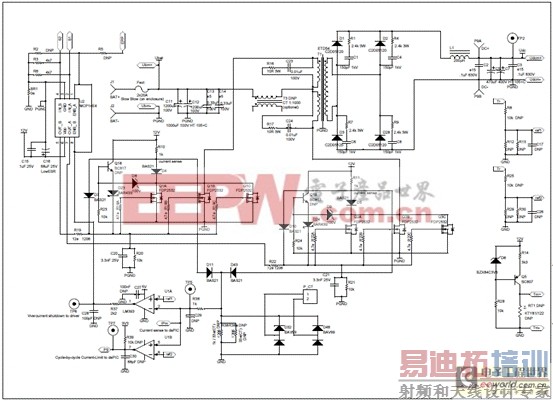
图13.离线UPS参考设计电路图(6)
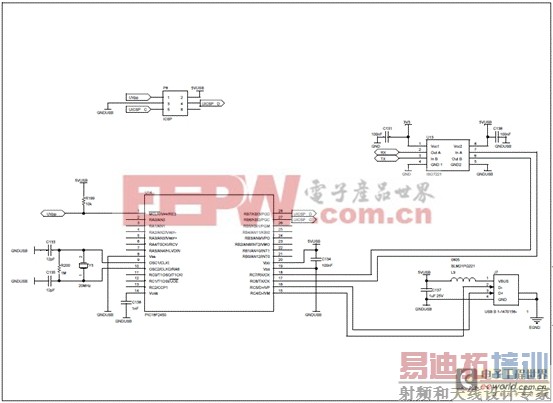
图14.离线UPS参考设计电路图(7)

图15.离线UPS参考设计PCB布局图(顶层)
详情请见:
http://ww1.microchip.com/downloads/en/DeviceDoc/70318D.pdf
和
http://ww1.microchip.com/downloads/en/AppNotes/01279B.pdf
Digital Pure Sine Wave Uninterruptible Power Supply (UPS) Reference Design dsPIC33FJ06GS101/X02 and dsPIC33FJ16GSX02/X04 Data Sheet High-Performance, 16-bit Digital Signal Controllers

图1.正弦波UPS参考设计外形图
UPS参考设计输入/输出指标:
Input / Output Specifications:
Input Range AC:
95 – 135V, 60 Hz (+/ - 3 Hz) (110V version)
210 – 242V, 50 Hz (+/- 3 Hz) (220V version)
Output Voltage AC:
110V @ 60 Hz (+/ - 1 Hz) (110V version)
220V @ 50 Hz (+/ - 1 Hz) ( 220V version)
DC Input:
36V (12 VDC X 3)
Lead Acid Battery
Rating:
1000 VA Steady-State Output Power
1350 VA Peak Power (Surge)
Features:
High-frequency design
Adjustable Charging current
Efficiency of 84%
Pure sine wave output with THD 3%
Mains to Battery Transfer time 10 ms
Supports Crest Factor of 3:1
Minimum Power Factor(Leading/Lagging) of 0.65
Fault indications
USB Communication with PC
LCD front panel
An Uninterruptible Power Supply, or UPS, is an electronic device that provides an alternative electric power supply to connected electronic equipment when the primary power source is not available.
Unlike auxiliary power, a UPS can provide instant power to connected equipment, which can protect sensitive electronic devices by allowing them to shut down properly and preventing extensive physical damage. However, a UPS can only supply energy for a limited amount of time, typically 15 to 20 minutes.
Although its use can extend to a virtually unlimited list of applications, in past years the UPS has become even more popular as a means of protecting computers and telecommunication equipment, thus preventing serious hardware damage and data loss.
Types of UPS Systems
A typical UPS for computers has four basic protection roles: being able to cope with power surges, voltage shortage, complete power failure and wide variations in the electric current frequency. There are three types of UPS systems, depending on how the electric power is being stored and relayed to the electronic device connected to them:
Offline UPS (also known as Stand-by UPS)
Line-Interactive (or Continuous UPS)
Online UPS (often called double conversion supply)

图2.离线UPS方框图

图3.采用dsPIC33FJ16GS504的离线UPS方框图
The reference design in this application note describes the design of an Offline Uninterruptible Power Supply (UPS) using a Switch Mode Power Supply (SMPS) dsPIC Digital Signal Controller (DSC).
The Offline UPS Reference Design consists of three major UPS topology blocks:
Push-Pull Converter (steps up the DC battery voltage to a constant high-voltage DC)
Full-Bridge Inverter (converts DC voltage to a sinusoidal AC output)
Flyback Switch Mode Charger (current source and charges battery with constant current)
1kW离线UPS主要指标:


图4.离线UPS参考设计框图

图5.开关模式充电器框图

图6.离线UPS详细框图

图7.离线UPS参考设计电路图(1)

图8.离线UPS参考设计电路图(2)

图9.离线UPS参考设计电路图(2)

图10.离线UPS参考设计电路图(3)

图11.离线UPS参考设计电路图(4)

图12.离线UPS参考设计电路图(5)

图13.离线UPS参考设计电路图(6)

图14.离线UPS参考设计电路图(7)

图15.离线UPS参考设计PCB布局图(顶层)
详情请见:
http://ww1.microchip.com/downloads/en/DeviceDoc/70318D.pdf
和
http://ww1.microchip.com/downloads/en/AppNotes/01279B.pdf
射频工程师养成培训教程套装,助您快速成为一名优秀射频工程师...
射频和天线工程师培训课程详情>>

